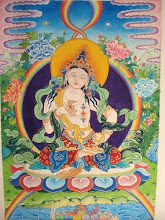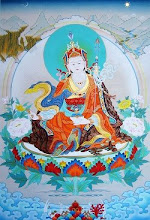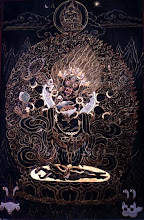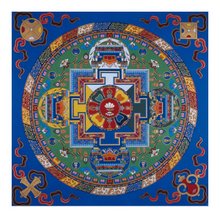
There are 227 rules of conduct for Theravada Buddhist monks, some them very minor, such as not having your robe washed by a nun unrelated to you, or accepting a rug made of black wool. (The Buddha on his death asked the minor rules to be relaxed; unfortunately, no one could figure out which rules were minor and which major, so nothing was changed).
Basically, ordaining as a monk means giving up life as an "ordinary" person, or putting away personal desire and personal comfort.
So it came as something of a surprise to find on the Bangkok subway that monks are a preferred class to whom healthy, "ordinary" persons should relinquish their seats. Unless the monk is ill, elderly, or otherwise incapacitated, I would assume that he should not be sitting while others stand and that should he need to sit the floor would suffice.
#



























As a result of my post, which I linked to the Buddhist forum e-sangha (http://www.lioncity.net/buddhism/index.php?showtopic=85368), I seem to find myself regarded as something of a boor, unable to appreciate the reverence of the Thais, expressions of respect for the sangha, or the challenges of the monastic life.
ReplyDeleteHaving spent twelve months of the past two years studying and living among monastics in Nepal, my impression is that except perhaps for having to share living quarters, the life of monks is not especially demanding. Rooms and meals are provided, sponsors drop by now and then with offerings of clothing, cash, and other goods; if you're a painter, you spend the day painting, if a shedra student then studying. Perhaps the most onerous “duty” are the frequent pujas, sitting and chanting for long hours, sometimes several days in a row. Of the monks I met and those I associated with, it seems I sat more regular mediation and read more books about Buddhism and philosophy.
I have much less direct knowledge of Thai monks, even though I've been traveling to Thailand for many years. I used to work in Bangkok and was on this visit attending a Thai friend's wedding. I don't claim expert knowledge on Thai culture, but neither am I complete novice. To even the newest visitor, though, it is quite obvious that Thais express deference for the sangha; it is equally clear that they are devoted to (or complicit through their silence in empowering) a cult of royalty, and that they put great stock in magical Buddhist amulets, divination, lucky numbers and the lottery. Many of the average Thai people I have met – professional, university educated – know less about Buddhist philosophy and history than this long-nosed farang. The Thai expression of respect for the sangha that some so admire may not be informed by anything more than tradition in the best case, but selfish desire to earn merit in the worst. As Gensei has pointed out, it's not really about the monk, but what the monk represents to the person engaged in “respecting” him. And if in fact Thais are somehow exceptional in showing respect for the sangha, why do they need to be reminded by the transit authority about something as simple as giving up a seat?
Respect, as we have all learned, is not something given, but something earned. Simply putting on a robe in a society like Thailand, where the majority of males put on robes at some time in their lives, doesn't seem to be an act meriting more than minimal respect, a nod of approval for making the decision to try something new, to explore a path that might lead to a new way of life or at least a new way of looking at life, the kind of respect we might offer in North America or Europe to someone for entering university.
Of the posters to the discussion, Tex seems to have the most sensible approach, that we stand when we can that others in need may sit. Whether or not the person is a monastic should have no bearing in the equation. Unless, of course, you're driving a pick-up like forestmat, in which case you can carry a bed-full of monks without displacing anyone.
#
I think you're misrepresenting what I said, slightly. They are respecting the intention and determination of taking up the path of awakening. The monastic sangha (indicated by the robe and the bowl) is the vehicle for the Buddhadharma in the world. They're responsible for that maintenance. So they're accorded respect in society.
ReplyDeleteWhether or not that creates the most ideal standards for practice, I don't know. In any particular set of circumstances, there are probably wonderful monks and complete waste of breathable air monks.
Speaking as a monk who's life isn't very difficult, I'm a little sick of people complaining that monk's don't have it so tough. The next time I have some whiny American Buddhist who's had a rough day with his kids come and tell me that I've got it easy, I may end breaking a precept. I wake up every morning alone, I go to bed every night alone. I've been doing that for ten years. I'll be doing it for a lot longer than that. Is that anyone's fault but my own? No. But most people certainly wouldn't live the way I do, even as easy as I've got it. They'd much rather have their terrible wives, kids, careers, bills, televisions, couches, etc. etc. etc. because at least that way they can sit around and think about how tough it is for them to get out of bed every morning.
Unless you live in Darfur or some other really terrible place like that, I think no one has the right to say somebody else hasn't got it that tough.
I could go on about this probably. Maybe I will in my blog. This little comment box is making me feel claustrophobic though. :-P
Maybe its just that humans tend to want what they don't have - the monk companionship, the couple solitude. Tough is what our choices have left us with; easy is what we want (or imagine we want).
ReplyDeleteOh, I don't envy anybody with kids. No way. They're great like tv is great: somebody else owns it and you can turn it off when you need to. :-P
ReplyDeleteWhich is what I usually say when people ask, in regard to Mutsumi and I not having offspring, if I don't like kids. I never used the TV analogy, though.
ReplyDelete